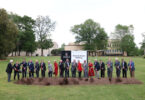How do you put a price on the environment?
Rebecca Moore, an assistant professor of natural resource economics in the Warnell School of Forestry and Natural Resources, struggles with that question. People have to make tradeoffs when it comes to Earth’s natural resources, giving up something to protect some part of the environment. The question is, she said, “Is it worth it?”Moore doesn’t throw such a controversial query out for kicks. She’s hoping her students are grasping the magnitude of such debates: How do you balance the benefits of protecting the environment or saving an endangered species with the cost associated with losing the opportunity to have something else, whether it’s water for irrigation, food for the hungry or money spent on healthcare and education?
While always interested in these big-picture questions, Moore wasn’t always headed toward a future as an economist. She earned a bachelor’s degree in geology from the University of Colorado in 2000, receiving her Ph.D. six years later in agricultural and applied economics from the University of Wisconsin.
While in school, she didn’t know where her education would lead her. She figured that the environmental problems we face today are closer to social conflicts caused by differing opinions and competition for resources rather than purely scientific dilemmas. Betting that policy makers would listen to economists over scientists when it came to environmental problems, she focused on economics in graduate school, learning two things along the way: “Policy makers don’t seem to listen to economists either, and good economic research is meaningless if it oversimplifies or misunderstands the science,” she said.
Moore believes the key to better decisions on environmental issues is working across disciplines, something she gets to do at Warnell—working with experts in multiple natural resource fields while teaching students about the economic implications of resource management.
The latter is quite tricky: How do you put a price on the environment? Because it’s not bought and sold, its value is intangible. Making her job even tougher is making sure those students understand the basic foundation of economics when so many have misconceptions about the subject. One way she does this is by bringing up examples from her own research or asking how students might decide if a policy to reduce pollution is a good idea. It’s interesting to see how differently students interpret the question of valuing the environment.
“With many environmental resources, like the clean air and scenic beauty that forests provide, we don’t pay for them,” she said.
“We enjoy these benefits until the forests are replaced with another land use. But just because something is free, that doesn’t mean it has no value. I would be willing to pay for the scenic forest even if I don’t have to pay, and the value of the forest reflects what I would be willing to pay. This is incredibly difficult to tease out.”




